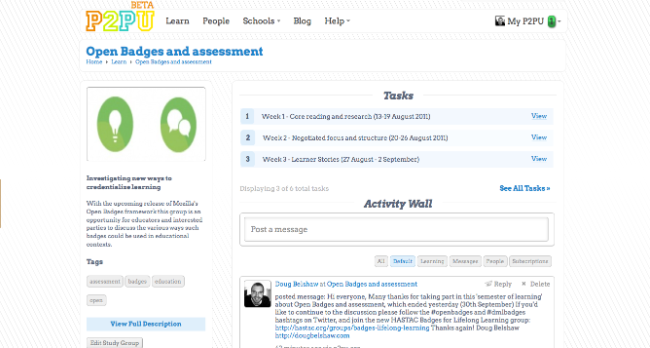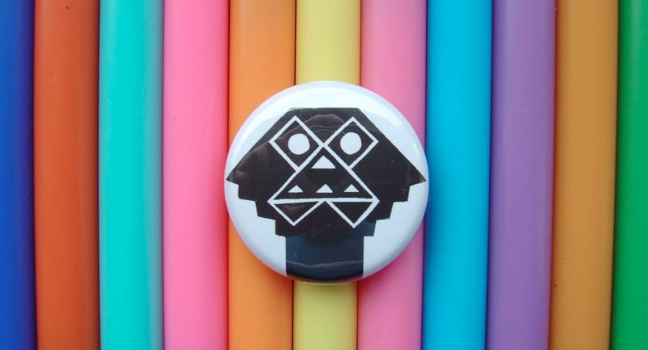
Seven weeks ago I proposed a ‘semester of learning’ about Mozilla’s Open Badges. This was originally going to be hosted on an installation of BuddyPress, but eventually resided at P2PU.org in a group called Open Badges and Assessment. It attracted a diverse mix of people, most of whom I’d never encountered before (I love it when that happens!) Many of use are continuing the conversation at a new HASTAC group.
In a similar way to a MOOC (Massive Online Open Course) the semester of learning was an informal affair where participants (of which there were 84 altogether) could be as active as they want. Again, as with MOOCs, many were content to listen in upon what others were talking about. Others played a more active role. I’ve archived the study group, but it will remain available indefinitely on P2PU.org for your perusal.
Things tailed off slightly towards the end, for two reasons. The first was that I was in the last couple of weeks of my thesis, so was spending all of my spare time on that. Secondly, the conversation moved from being in a niche area to being much more mainstream (via Twitter, etc.) with the launch of the DML Competition
As a taster of what went on in the semester of learning here’s some comments from the beginning and towards the end.
Week 1
There are key questions around ensuring quality for these badges to take hold. If they are to become something valuable on a CV for example then a prospective employer needs to be able to ascertain the level & rigour involved in the aquisition of the badge. (Dan Stucke)
I’m really impressed by the scope of this Mozilla project. I must admit, I signed up merely because I am interested in looking at ways for developing badges in a high school context, so to see this scale up in such a monumental way is pretty inspiring.
The potential for a new standard in qualifications that learners continue to build upon is very interesting. For example, my own degree and teaching qualifications are relatively old compared to everything I have learned since, and even though there is no formal recognition of my increased learning over the years, save a few references from previous employers, I’d say the undocumented skills I have now make me a far more qualified person than I appear to be on paper. I think the case studies from the open badge system framework draft make this point quite well. (Jackson Bates)
My main worry about the badges appraoch is that it will only be a kind of add-on to the normal educational modle. What I’m mainly interested in doing is entering into direct confrontation with the university as it currently exists. I want to fight with the university, offer an alternative to it, and fundamentally challange the values at work in the university. I’m worried that a badge just isn’t going to cut it, that it won’t be taken seriously enough or that it will only be taken seriously as an add-on to a “real” university education. (Thomas Gokey)
Week 6
Every time a new educational fad erupts it seems to be polarizing, which seems to hold true in the conversations surrounding the dml announcement. Instead of talking about whether we agree or disagree with the movement a better topic would be, what can these badges do for education, specifically assessment?
I am excited to see what comes of the research grants for the badges. Will we start giving badges instead of end of course assessments/exams? Would that be a good thing? How would it work?
Yes of course it would be messy, but what if students had to obtain specific badges to pass into the next grade or to receive a high school diploma? Would it motivate students to complete their coursework or would it only further increase dropout rates? At any rate it is obvious that we would have to get the buy in of students to pull this off effectively…. (AndiStrack)
In the twitter about the grants, people expressed concern that there would be a proliferation of badges of dubious value. Nobody can stop that from happening and it would not be desirable. Our organization plans to categorize and rank badges by difficulty. We think our website that lists the badges will get substantial traffic just as our lists of open textbooks have done. (Jacky Hood)
Conclusion
I found P2PU.org a fantastically easy way to setup a study group and would certainly do so again. I think that the semester of learning helped point people towards certain resources that they may not otherwise have seen and, perhaps more importantly, engage with other people they may not have come across. It was great to see, given some of the superficiality and shallow reading evident from those reacting in various backchannels during the announcement, that those who were part of the group were committed to going away to think and read.
What did we learn? Well, I think I can speak on behalf of us when I say that talking of ‘badges for lifelong learning’ sounds simple but actually contains a lot of nuance and hidden complexity around assessment. I’m very much looking forward to continuing the conversation both on Twitter (using the hashtags #openbadges and #dmlbadges) and within the new HASTAC group. 🙂



